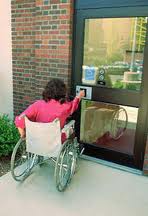Mobility Impaired
Wheelchairs users though have different disabilities possess varying abilities too. Some can use their arms and hands. Some can get out of their wheelchairs and even walk for short distances.
It should be kept in mind that wheelchair users are people, not equipment. Never ever lean over someone in a wheelchair to shake another person’s hand or ask a wheelchair user to hold coats. Setting your drink on the desktop attached to someone’s wheelchair is a definite no-no.
No one should push or touch a person’s wheelchair; it’s part of his/her personal space. Without waiting for instructions, you may detach the chair’s parts if you lift it by the handles or the footrest.
Keep the ramps and wheelchair-accessible doors to your building unlocked and unblocked.
Be aware of wheelchair users’ reach limits. Place as many items as possible within their grasp. There should be a clear path of travel to shelves and display racks in the shops.
When talking to a wheelchair user, grab your own chair and sit at her level. If that’s not possible, stand at a slight distance, so that she isn’t straining her neck to make eye contact with you.
The service counter at your place of business must not be too high for a wheelchair user to see over. Others should step around it to provide service.
Proper signs to direct wheelchair users to the most accessible ways around the building needs to be placed. People who walk with a cane or crutches also need to know the easiest way to get around a place, but stairs may be easier for them than a ramp. Ensure that security guards and receptionists can answer questions about the most accessible way around the building and grounds.
If the nearest public restroom is not accessible or is located on an inaccessible floor, allow the person in a wheelchair to use a private or employees’ accessible restroom.
People who use canes or crutches need their arms to balance themselves, so never grab them. People who have limited mobility may lean on a door for support as they open it. Pushing the door open from behind or unexpectedly opening the door may cause them to fall. Even pulling out or pushing in a chair may present a problem.
Never forget to ask before offering help.
If you offer a seat to a person who has limited mobility, keep in mind that chairs with arms or with higher seats are easier for some people to use.
Be sure to set out adequate warning signs after washing floors. Also put out mats on rainy or snowy days to keep the floors as dry as possible.
People who do not have a visible disability may have needs related to their mobility. For example, a person with a respiratory or heart condition may have trouble walking long distances or walking quickly. Be sure that office, hotel or department store has ample benches for people to sit and rest on.
Some people have limited use of their hands, wrists or arms. Be prepared to offer assistance with reaching for, grasping or lifting objects, opening doors and display cases, and operating vending machines and other equipment.
Never invite the wheelchair users to a party or a get together or to a place which is not accessible for them.It would lead to their embarrassment.


